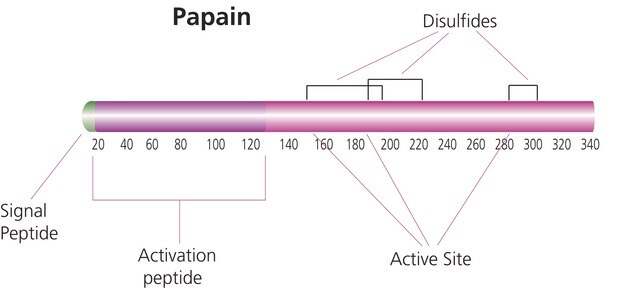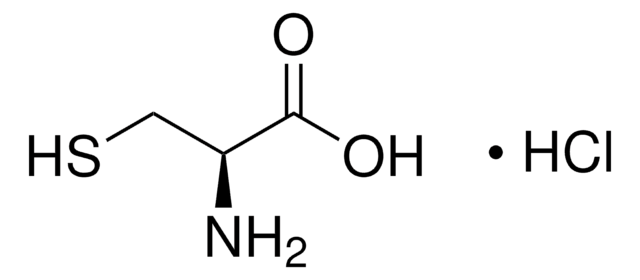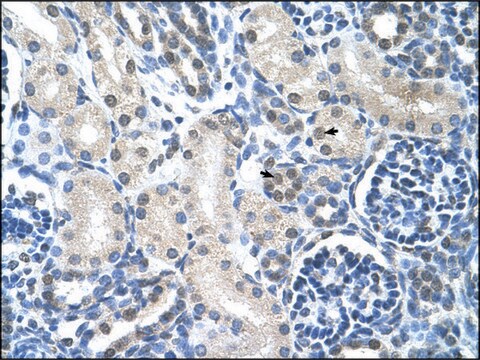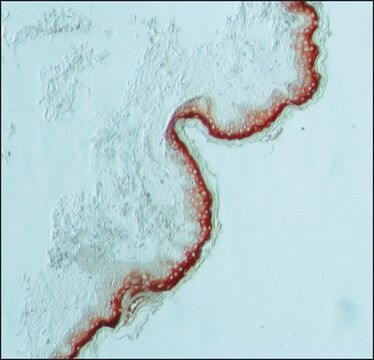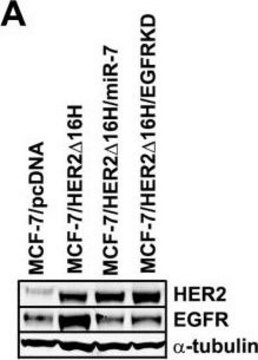추천 제품
생물학적 소스
human
Quality Level
재조합
expressed in E. coli
분석
>95% (SDS-PAGE)
양식
frozen liquid
특이 활성도
1.67 units/mg protein
분자량
26 kDa
농도
1.8 mg/mL
저장 온도
−70°C
유전자 정보
human ... GSTM4(2948)
일반 설명
using spectrophotometric determination of 1-chloro-2,4-dinitrobenzene (CDNB) conjugation with reduced glutathione (1 mM) in 100 mM NaPO4 (pH 6.5) at room temperature.
생화학적/생리학적 작용
Cytosolic and membrane-bound forms of glutathione S-transferase are encoded by two distinct supergene families. At present, eight distinct classes of the soluble cytoplasmic mammalian glutathione S-transferases have been identified: alpha, kappa, mu, omega, pi, sigma, theta and zeta. This gene encodes a glutathione S-transferase that belongs to the mu class. The mu class of enzymes functions in the detoxification of electrophilic compounds, including carcinogens, therapeutic drugs, environmental toxins and products of oxidative stress, by conjugation with glutathione. The genes encoding the mu class of enzymes are organized in a gene cluster on chromosome 1p13.3 and are known to be highly polymorphic. These genetic variations can change an individual′s susceptibility to carcinogens and toxins as well as affect the toxicity and efficacy of certain drugs. Diversification of these genes has occurred in regions encoding substrate-binding domains, as well as in tissue expression patterns, to accommodate an increasing number of foreign compounds. Multiple transcript variants, each encoding a distinct protein isoform, have been identified.
Glutathione S-transferase mu 4 (GSTM4) is an enzyme that in humans is encoded by the GSTM4 gene. Glutathione S-transferases (GSTs) are a family of enzymes that play an important role in detoxification by catalyzing the conjugation of many hydrophobic and electrophilic compounds with reduced glutathione. Based on their biochemical, immunologic, and structural properties, cytosolic and membrane-bound forms of glutathione S-transferase are encoded by two distinct supergene families. At present, eight distinct classes of the soluble cytoplasmic mammalian glutathione S-transferases have been identified: alpha, kappa, mu, omega, pi, sigma, theta and zeta. The GSTs are thought to function in xenobiotic metabolism and play a role in susceptibility to cancer, and other diseases.
저장 및 안정성
The enzyme should be used by the end-user customer within 1 year of receipt.
Storage Class Code
10 - Combustible liquids
WGK
WGK 1
Flash Point (°F)
Not applicable
Flash Point (°C)
Not applicable
가장 최신 버전 중 하나를 선택하세요:
A Iida et al.
Journal of human genetics, 46(10), 590-594 (2001-10-06)
A major goal in our laboratory is to understand the role of common genetic variations among individual patients as regards susceptibility to common diseases and differences in therapeutic efficacy and/or side effects of drugs. As an addition to the high-density
Jackie Denson et al.
Gene, 379, 148-155 (2006-07-21)
The glutathione S-transferase Mu class (GSTM) genes encode phase II metabolism enzymes that are involved in the detoxification of various carcinogens and drugs. Some genetic polymorphisms in GSTM genes are related to disease phenotypes and drug-metabolism differences in the population.
자사의 과학자팀은 생명 과학, 재료 과학, 화학 합성, 크로마토그래피, 분석 및 기타 많은 영역을 포함한 모든 과학 분야에 경험이 있습니다..
고객지원팀으로 연락바랍니다.